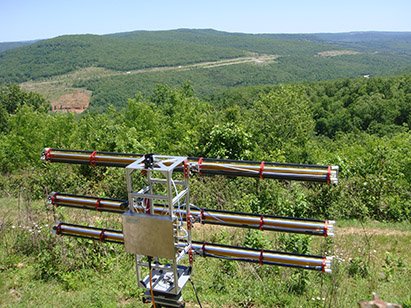
FAYETTEVILLE, Ark. – An engineering researcher at the University of Arkansas has received $1.14 million in funding to develop a decision support system for assessing areas at risk for mudslides or rock falls caused by the effects of wildfires. The funding includes a $570,000 grant from the U.S. Department of Transportation, $433,000 in matching funds from the university and $137,000 in matching funds from other institutions.
The system, based on remote-sensing technologies, will help highway managers determine the threat of mudslides or rock falls to transportation infrastructure, develop plans to close routes and ensure public safety.
.jpg) “The hazard to infrastructure resulting from wildfires includes the initial damage associated with the wildfire and then secondary effects from the wildfire denuding the soil,” said Richard Coffman, assistant professor of civil engineering and principal investigator. “To combat these hazards, transportation officials typically rely on various maps that document burn severity, soil composition, geology and topography – but these tools do not offer the high spatial and temporal resolution of remote-sensing data. Our decision support system will include these technologies to help officials characterize the risk to infrastructure.”
“The hazard to infrastructure resulting from wildfires includes the initial damage associated with the wildfire and then secondary effects from the wildfire denuding the soil,” said Richard Coffman, assistant professor of civil engineering and principal investigator. “To combat these hazards, transportation officials typically rely on various maps that document burn severity, soil composition, geology and topography – but these tools do not offer the high spatial and temporal resolution of remote-sensing data. Our decision support system will include these technologies to help officials characterize the risk to infrastructure.”
Coffman will collaborate with researchers at Michigan Technological University and Idaho State University to develop the decision support system. The system will use data collected from satellites, unmanned aerial vehicles and ground-based thermal, radar and light-detecting technologies that examine the earth’s surface. Their work will be added to a larger decision support system, developed by researchers at Idaho State University and the National Aeronautics and Space Administration, that is currently used for ecological rehabilitation following natural disasters.
The remote-sensing technologies will allow the researchers to determine “locations of interest,” that is, to use different parameters to develop risk profiles to characterize the likelihood of mudslides or rock falls following a wildfire. These parameters, based on imaging at a pixel-by-pixel scale, will include geographic location and topography, as well as information on burn severity, soil suction, soil-water content, rock type and clay content.
“With the frequent wildfires in California and other locations in the West, this research is more relevant than ever,” said Coffman. “In addition to potentially saving lives and reducing inconvenience for motorists, our work could help limit damage to property.”
Contacts
Richard Coffman, assistant professor, civil engineering
College of Engineering
479-575-8767,
Jim Rankin, vice provost for research and economic development
Research and Economic Development
479-575-2470,
Matt McGowan, science and research communications officer
University Relations
479-575-4246,